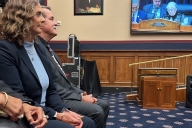You have /5 articles left.
Sign up for a free account or log in.
A couple of years ago, advocates for rape survivors and victims celebrated.
California’s Legislature passed a new law -- one that created, in the activists’ view, a strong definition of consent and cemented into state statute portions of federal guidance on how colleges should handle sexual assault cases.
Such state legislation, not just California’s, but also in New York and Illinois, surpassed what federal rules required, but never clashed with them.
But now President Trump’s Education Department is widely expected -- perhaps this week -- to readjust that guidance, which was issued in 2011 by the Obama administration, setting up, in some experts’ opinions, inevitable court challenges should those state laws conflict with whatever directive comes from Education Secretary Betsy DeVos. A key change could come with the standard of proof the Obama-era department recommended institutions use to judge sexual assault cases -- some states have adopted those guidelines into law, but the issue could become troublesome should DeVos mandate something else.
“Because of the Title IX revelation, a lot of states have created mimicking laws, tailored to the federal system, or that exceed it,” said Peter Lake, a law professor and the Charles A. Dana Chairman and Director of the Center for Higher Education Law and Policy at Stetson University’s College of Law. “It almost has to go court, because that’s how to resolve conflicting legal mandates. This is not the first time this has happened, but for higher ed -- with safety measures -- it has not really been down this path.”
Advocates for sexual violence prevention worried early in the Trump administration that DeVos would rescind entirely the 2011 Dear Colleague letter from Obama’s Education Department that was meant to clarify parts of the federal antidiscrimination law Title IX of the Education Amendments of 1972.
Per the guidance, each institution needed to formulate an impartial process for judging sexual assault cases, though critics of the letter often say that colleges were overzealous in implementing it, creating bias against students accused of sexual assault.
Another contentious point was the standard of proof that the guidance imposed -- colleges were required to use “preponderance of evidence” in adjudicating rape allegations, defined generally as a 50.1 percent chance that the accused individual was responsible. It’s the standard the U.S. Supreme Court uses in civil litigation involving discrimination, and what most institutions rely on for other student conduct violations, like assault or hazing. However, prior to the Education Department's guidance, many colleges relied on standards closer to guilt beyond a reasonable doubt.
Any California college receiving state money needs to use the preponderance measure, per the law that passed in 2014.
Called the “yes means yes” law, it also, controversially, altered California’s definition of consent to mean that both parties needed to affirm their willingness to participate in a sexual encounter -- rather than stop when they hear no.
A legal skirmish could come with the California law if DeVos signaled colleges to review sexual assault cases by the higher standard -- “clear and convincing evidence,” Lake said. He was not aware of any institutions using clear and convincing prior to 2011, and so laws did not conflict and college administrators didn’t need to walk back their policies.
Joseph Storch, associate counsel with the State University of New York, called such a prospective battle “ugly.”
Storch assisted with New York’s “Enough Is Enough” law that he said put the federal guidance into “plain language.”
That law contained a similar provision to California’s on affirmative consent, which drew the most criticism and media attention at the time. Shortly after Governor Andrew Cuomo signed the law in early July 2015, Kevin Kruger, the president of NASPA: Student Affairs Administrators in Higher Education, penned an opinion column in The Washington Post detailing his concerns with state legislation on campus sexual assault.
With states adopting their own measures, the country will soon see a “patchwork” of laws dictating complex processes, Kruger wrote.
“No student is going to ask themselves, ‘What state am I in? What definition of consent do I have to apply here?’ which means the patchwork approach will ultimately fail to meet the needs of students and become a bureaucratic mess for institutions,” Kruger wrote.
But Storch said the standardized policy benefited SUNY’s 64 campuses and roped in intelligent and vocal advocates both internally and from outside the system to work on a deeply important issue. He said the system considered the consent definition far less interesting than some of the other aspects of the law, like the student “bill of rights” that must be dispensed among New York institutions.
It details students’ options in reporting sexual violence and the college’s responsibilities. The law also immunized students from consequences for other conduct violations if they reported a sexual assault. Other states have enacted such mandatory amnesty policies, like Texas.
Pieces of the New York and California laws have been highlighted in a report prepared by advocacy group Know Your IX, with contributions by organizations like the National Women’s Law Center and SurvJustice.
The “state policy playbook” outlines the ideals for states and highlights Illinois and Minnesota as well. Minnesota requires its colleges to report data about the number of sexual assaults and the outcomes of disciplinary proceedings and has created an online system that allows for anonymous reports. In Illinois, colleges must publicize gender-based harassment and violence policies, and an adviser must be designated to help victims who want to report.
Some advocates feel this aggressive approach by states is necessary, given the political climate.
The Education Department has “walked away” from its responsibility to enforce civil rights and so the states must “step up,” said Sejal Singh, a policy coordinator with Know Your IX and one of the authors of the playbook.
“There’s a lot of state interest in stepping in and filling the enforcement gap with procedures that are fair and so that survivors feel safe coming forward. Schools are doing this to prevent this violence in the first place,” Singh said, adding that no state statute currently defies federal law or regulation.
Legislation that would mandate colleges inform police about sexual assault allegations, versions of which have been proposed in Delaware, Georgia and Virginia, would have chilled survivor reports, and the legislation proposed in Georgia, in particular, might have diverged from Title IX, Singh said.
Mostly, the Obama administration steered away from state-level conversations on sexual assault, and Singh believes Trump will do the same, though she was unsure of the direction his Education Department would take with new or tweaked guidance.
DeVos and her top civil rights official, Candice Jackson, have met with activists, both those who advocate on behalf of sexual assault survivors and those who feel the current system has slighted accused students and unfairly punished them for crimes they didn’t commit.
Storch has not been vexed by potential federal changes, saying he would prefer to react quickly rather than mull the endless possibilities that could come from the department. No one from SUNY was asked to speak with DeVos or officials, but he said that they would welcome it.
One person who did attend one of DeVos’s July “listening sessions” on Title IX was Michelle Johnston, president of the University of Rio Grande and Rio Grande Community College, a combination four-year private university and two-year public institution in Ohio.
She said she couldn’t discern DeVos’s inclinations on Title IX guidance -- the secretary largely remained quiet and took diligent notes, allowing the presidents and other attendees to lead the conversation.
“I stressed that higher education has experienced some really positive movement,” Johnston said. “With our Title IX coordinators, educational activities and training expectations of our students, it’s really, really positive for our campuses in terms of our student safety. At the same time, looking at that Dear Colleague letter, for our campuses and within the Department of Education, we always have a spirit of continuous improvement.”
She told the secretary that the 60-day completion window for investigations required by the Obama administration might not be reasonable.
Johnston’s state launched a campaign two years ago, acting on an edict from Governor John Kasich, to not remedy sexual assault legislatively, but through policy in the Ohio Department of Higher Education.
She helped lead the “changing campus culture” effort, initiated with a $2 million infusion from the state’s General Assembly. Its hallmark is a campus climate survey, the results of which allow the department to alter its strategies.
Prior to the work in Ohio, administrators’ understanding of Title IX was mixed, Johnston said -- all of them grasped the minimum requirements, but the optional campaign, present now on 89 campuses, both public and private, has yielded great results, she said.
The Ohio department reported that the percentage of public university students who had been trained in sexual assault prevention jumped from 29 percent in 2016 to 56 percent in this year’s survey.
Kerry Soller, project manager for campus safety and sexual violence prevention at the Ohio Department of Higher Education, said she guessed that the initiative didn’t need to be forced legislatively because of significant interest in eliminating sexual assault.
Because the program was not formed by law, the department maintains a degree of flexibility in altering it to match any new federal requirements, Soller said.
“We didn’t want to fully focus on just compliance,” Soller said. “That doesn’t change culture; we’re going to change the culture. If we’re going to have a holistic program, compliance and guidance has to be a part of it, but it can’t be the sole piece, it can’t be the centerpiece.”
Should DeVos rescind the 2011 Dear Colleague letter tomorrow, campuses wouldn’t stop their current practices, said Johnston. These student protections are not an obligation, and the current structure has already been infused into her college to an extent where it would not make sense to dismantle it, she said.
“That’s the most encouraging part to me -- it’s still ongoing, we’re still discussing this issue. As long as that’s going, I feel more confident we’ll solve this in the end,” she said.






![First text message: "Yes?" Second message: "This is embarrassing to say, but law school isn't fair for us men, the women are always outperforming us at [sic]. It's obvious women are taking over the legal profession nowadays." Third text: "Who is this?"](/sites/default/files/styles/image_192_x_128/public/2024-09/Text_messages_law_2.jpg?itok=0QWP419B)

